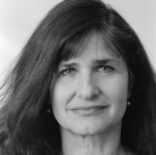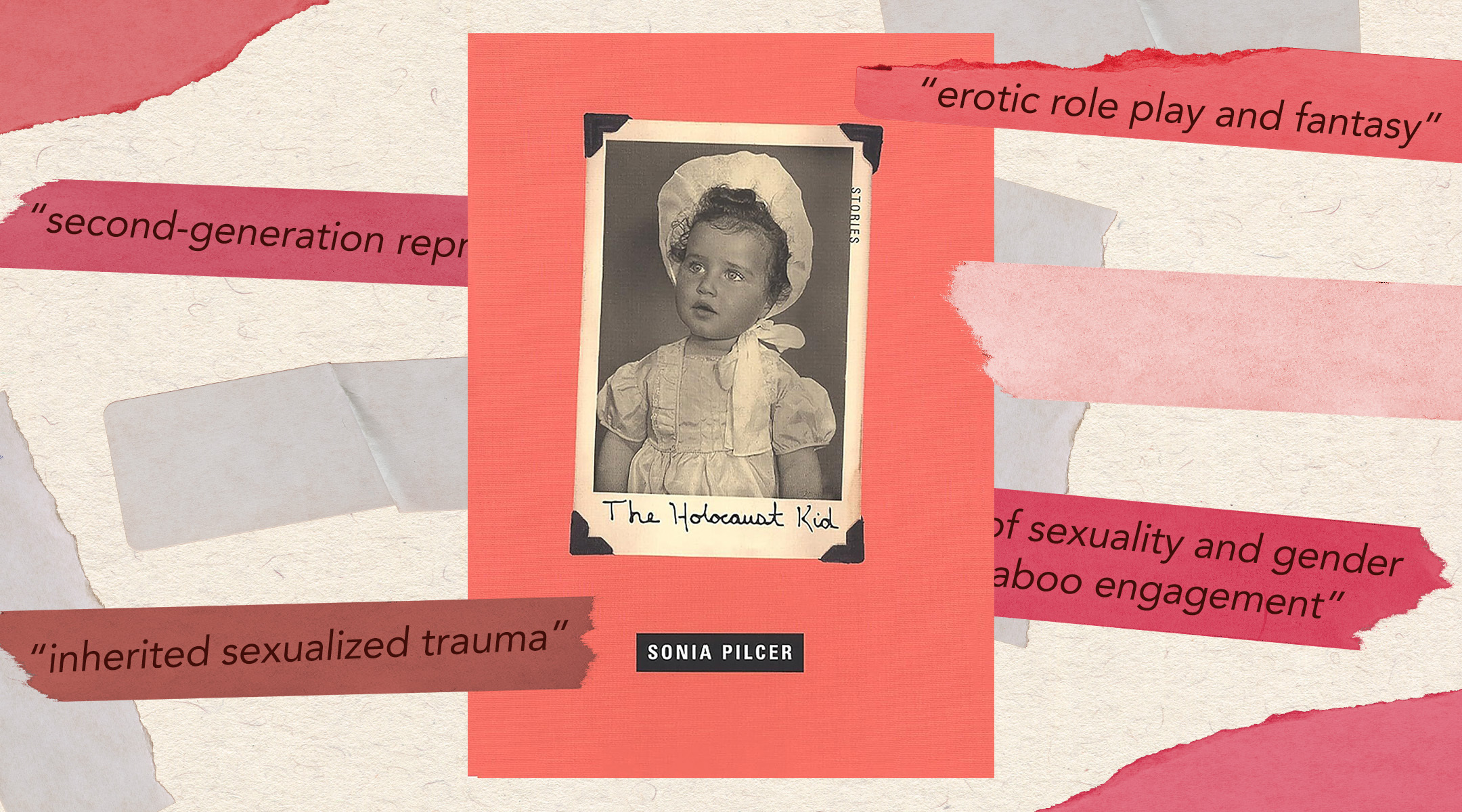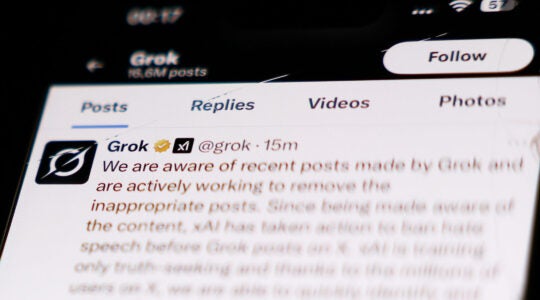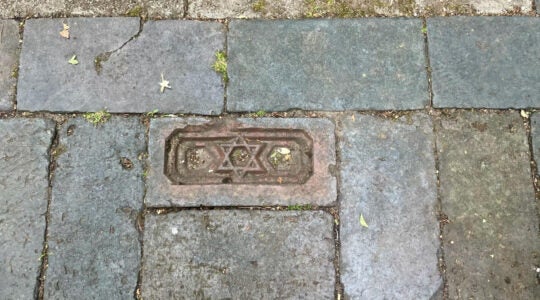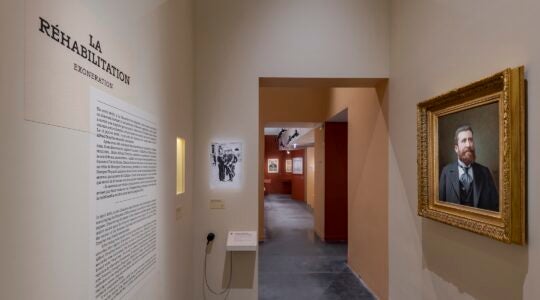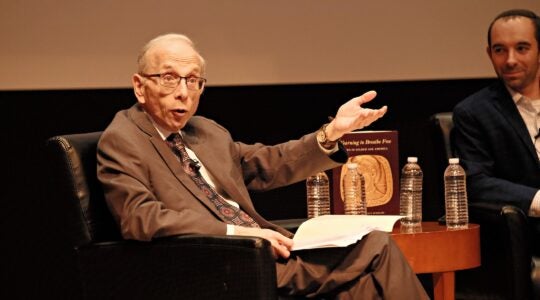(JTA) — Recently, I opened my email and found a link to an article in a scholarly publication, The Journal of Jewish Identities, published by Johns Hopkins. Puzzled, I clicked and discovered the following: “‘I was a prisoner. Jew. Whore’: Inherited Sexualized Trauma in Sonia Pilcer’s ‘The Holocaust Kid’ by Alex M. Anderson and Lucas F. W. Wilson.”
I read the headline and gasped. “The Holocaust Kid” is a novel of interconnected stories I published in 2001. In it, I explored the psychological and existential perspective of being the daughter of Holocaust survivors, but not reverentially. (Hence the title.)
Sure, it is semi-autobiographical. And yes, I was scarred by my history. But had I really “inherited sexualized trauma”?
I began writing ”The Holocaust Kid” in the early 1980s. It was written in an edgy style, used in my first novel “Teen Angel,” that a New York Times reviewer described as “tough and sweet, rude, loud and hilariously filthy.” I worked on much of the book in Israel, wanting to live in a country of survivors. But I hadn’t realized how uncomfortable the subject was, almost taboo, until I gave a reading in Jerusalem to a room filled with young writers and journalists. After I finished, there was hostile silence. One listener finally asked, “Why write this? And why are you reading it here?” I answered, “Because I’m a writer.” I had stories I wanted to tell, and believed that my take on the Big H, as my protagonist Zosha calls the Holocaust, needed to be heard. But the question should have alerted me to the difficulties my manuscript would face.
I didn’t know, nor did my agent Carl Brandt, who had sold my two previous novels, that it would take 20 years, over 40 rejections, countless rewrites and several more agents to sell this book. It was treated as nasty and unseemly — and I, an untouchable — by editors, many of whom were Jewish. Perhaps the editors were offended by the language. Or was I making fun of the Holocaust, as some editors suggested?
I suppose I am interested in the transgressive, but I had no intention of being disrespectful. A good joke, I thought, is the best way to deliver a devastating blow. I learned that from the survivors.
In lieu of living family, my parents belonged to a large network of Polish Jews. All were survivors. The women played canasta and men, poker. As they tossed their bright plastic chips and picked up cards, blue numbers flashed on the insides of their arms. Their stories were profoundly and terrifyingly cynical about human nature. Yet often funny, and extremely dark.
“You remember Yola? She was the not bad-looking one with crooked teeth, who went with the German. He gave her crabs.” Laughter. “If Bolek hadn’t shared his piece of bread, I wouldn’t be here. Lucky me, I was dealt three queens!”
I was born in a German DP camp, but I was raised on the streets of Brooklyn and Washington Heights, where I attended tough public schools. I rebelled against my Jewish/Holocaust background and joined a girls street gang. It is a complex matter to write about the Holocaust and its inheritors. I realize the subject was inviolable. And I admit that my take on survivors and their children is troubling, but that’s what I meant to do: to give it a raw, provocative slant, growing out of my experiences.
The book was finally sold by Gareth Esersky to a small, courageous press, Persea Books, and editor Karen Braziller. The pub date was September 2001, right before the tragedy of 9/11. The book was mostly ignored, but I did get an email from the husband of a well known therapist and filmmaker who is a Second Generation descendant of survivors, or “2G.” (In 1987, I believe I introduced the term “2G,” in a short-lived New York magazine called Seven Days.) He wrote that ”The Holocaust Kid” was a travesty, that I insulted the memory of the dead and should seek psychological help.
The almost universal rejection by the Jewish literary community was painful. But I carried on, kept writing and published other books.
Twenty-one years later, I was contacted by Lucas Wilson, who was writing his doctoral dissertation about Second Generation writers. His subjects included Art Spiegelman, Helen Epstein, several others and me. I had watched on Zoom as he defended his thesis. End of story, I thought.
A year or so later, I received the email with a link to an article by him and another graduate student, Alex Anderson. The scholars focused on the most controversial story in the collection, “Shoah Casanova.” This story involves a sexual encounter between Zosha and Uly Oppenheim, a Jewish Holocaust professor, who like Zosha, is 2G.
As they begin their lovemaking, he takes off his tie and begins to snake it around her. “He was the master. Ubermensch. Superman. So powerful,”” she thinks. “It was 1942. I was a prisoner. Jew. Whore. … If I made him love me, he’d take me through the war. I would survive.” As he is about to climax, he says, “I’ve got something for you, my little refugee. This comes all the way from Oswiecim.” Oswiecim is the Polish word for Auschwitz.
The scholars wrote, “The protagonist, Zosha Palovsky, engages in Nazi-Jewess erotic fantasy and role play as a way of addressing, albeit obliquely, her inherited sexualized trauma… [I]t gives voice and, as it were, body to what she imagines her mother to have gone through.” They continue: “Inherited sexualized trauma can thus be defined as the second generation’s adopted psychic and affective wounds that stem from what they imagine to be their parents’ experiences of sexualized violence during the Holocaust.”
Whoa! When I wrote ”Shoah Casanova,” I wasn’t thinking about my mother’s trauma, nor my own. I was trying to describe my character’s attraction/repulsion to Uly, and to their master/slave game. This is one more variation on the theme of how the Holocaust plays out in both of their lives. So it was weird to have the language of trauma applied to my story and, by implication, to me.
While he was writing his dissertation, Wilson and his mentor, Alan Berger, questioned me more than once about the identity of Uly Oppenheim, the kinky Holocaust professor, but I refused to reveal it. Why? Because I made him up, just as I made up his book about female survivors forced to work in brothels, titled “Our Bodies, Not Our Souls.” To me, this is the pleasure of creativity — making things up.
I cannot deny that the book contains episodes from my life. But I take refuge in what Carl Brandt told me when I was starting out: “There’s no way for anyone to know what actually happened and what’s fictionalized.” And I recall Philip Roth’s remark: “I say to my imagination: ‘This is what really happened. Can you top this?’”
After I sent a few friends the Wilson/Anderson article, they asked with concern, “How do you feel about this?”
If I am honest, at first, I felt thrilled to have my work read at all, after so long, and analyzed by scholars. Then I began to wonder: How much truth is in their thesis?
I remember a story my mother once told me. She worked at a munitions factory in a forced labor camp. Once she returned after curfew. A soldier caught her. He forced her to take off her dress and clean the street with it. Then he laughed and walked away. For the rest of her life, my mother remained frightened of men in uniforms. I once saw her grovel before the mailman, but I do not think this was not sexualized trauma.
The desire for domination is hardly limited to the Jewish/Nazi dynamic. Many women and men run fetishistic scenarios in their minds. You don’t have to be Jewish to enjoy humiliation, at least in your fantasies. Besides, they’re just playing. And dead serious.
Yet there is something deeply embedded in our culture’s collective unconscious that feeds on the notion of Holocaust “sexualized trauma.” It’s in the ether. Consider the films “The Night Porter,” “The Pawnbroker,” “Sophie’s Choice” and “Schindler’s List.” All of them feature scenes of terrified, naked women.
Twenty years after my book came out, and 80 years after the Holocaust, writers and filmmakers are finding new ways to tell the story. Some are breaking taboos about whose stories should be told, some are using humor and others have focused on the children and grandchildren of survivors and victims. A recent film, “The Zone of Interest,” written and directed by Jonathan Glazer, captures the horror from the point of view of Nazi commandant Rudolf Höss and his family, who live in an idyllic house. It shares a wall with Auschwitz. We see their lush gardens, parties with children jumping in a swimming pool. But in the background, there’s the insistent sounds of gunfire and screaming. And no one notices.
“We’ve become desensitized,” Glazer has said. “It’s impossible to show what happened inside those walls. “And in my opinion, one shouldn’t try.” Instead his interest was in creating “ambient evil.” The effect is powerfully haunting.
Although I did not agree with the scholars’ thesis, they gave me a reason to go back to a novel I began many years ago. My hardest one to write. The most difficult to sell. My most personal book. “The Holocaust Kid” lives on.
JTA has documented Jewish history in real-time for over a century. Keep our journalism strong by joining us in supporting independent, award-winning reporting.
